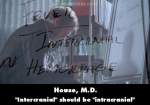Factual error: There are several episodes where doctors continue to defibrillate a patient even after s/he flatlines. A flatline (asystole, where there is no electrical activity in the heart) cannot be corrected by defibrillation, which stops a heart that's in an abnormal rhythm and gives it a chance to start in a normal one (the heart has already stopped when there is a flatline).
Factual error: In an episode with a severely overweight patient who is thought to have diabetes, it is discovered he instead has Chagas disease. Cameron then informs the patient that he acquired this illness from his food when, in fact, Chagas disease is a protozoan that is spread through the bite of the triatomine bug.
Suggested correction: While the main vector for the infection is through the triatomine bug, Trypanosoma cruzi (the parasitic organism that causes the disease) can be transmitted through food, and thus Chagas was caused by the food the patient ate. It should also be noted that Trypanosoma cruzi is not transmitted by the bite of the triatomine bug, but rather through its feces, and it's only spreads once the feces enters the blood stream (which it can do through a bite site or scratching an open wound).
Factual error: Every time there is a patient given a non-rebreather O2 mask, the bag is uninflated. The correct way of administering O2 through a NRB is to inflate the bag first, which would be the reservoir for the O2; a common mistake in many Hollywood medical shows.
Factual error: House is playing 'Metroid: Zero Mission' on his Gameboy at various times. The Metroid series does not feature space monkeys, nor are there distinct levels. The sounds coming from the game in the show do not match it in real life, and Samus morphing into a ball is most definitely not a failure state.
Factual error: The whole episode is caused by medications being mistaken for one another. But the reason why is actually impossible. The patient states that the pills he took (in error due to a switch) had no letter or marking on them. With few exceptions - none of which apply to the medication the patient took - the US FDA law states that all solid medications must have a letter and/or number on each pill which allows them to be identified. No pharmacist would ever give out blank pills.
Factual error: House's team listed the potential offending organisms of the infection as "MRSA, H. Flu, VRE, and pseudomonas." House then suggests Vancomycin and Aztreonam. Vancomycin only covers gram (+) organisms and Aztreonam only covers gram (-) organisms. VRE is a gram (+) organism, thus it would not be covered by Aztreonam. VRE stands for vancomycin resistant enterococcus, thus it would not be covered by Vancomycin either. House's team therefore failed to cover for an offending organism that could have caused the infection during their initial differential. (00:09:10)
Fidelity (aka: Truth or Consequences) - S1-E7
Factual error: House rules out Lyme disease from being the cause of the sickness, since he says Lyme disease presents with a rash, which the husband would have noticed. However, although a rash is a common symptom of Lyme disease, it is by no means universal. Estimates suggest that around one-third of people with the disease don't exhibit that symptom. Doctors wouldn't therefore rule out Lyme disease solely in the absence of a rash. (00:10:25)
Factual error: When going into anaphylactic shock, the patient is given epinephrine in her forearm. Epi would be given into her lateral thigh, or deltoid muscle. The forearm would be the least ideal place for an IM injection.
Role Model - S1-E17
Factual error: House and Foreman tell the Senator that he has toxoplasmosis, which is caused by a fungus. Toxoplasmosis is actually caused by a protozoan parasite.

Factual error: When House is looking over his whiteboard of symptoms for the swimming patient, the symptom "Intercranial Hemorrhage" is shown on the board. However, this is an error. The correct term is "Intracranial Hemorrhage." Anything inside the head is referred to as "intra" not "inter." This is a common mistake for laypeople, however the highly trained and knowledgeable Dr. House should not have made that error. (00:31:25)
Factual error: When Andie is going in for her MRI, Chase starts the machine with Andie's steel IV pole in the room. No doctor would ever do that considering the damage that would be done to machine and patient. (00:05:45)
Factual error: Cameron forces House (against his wishes) to do the biopsy on Foreman because Foreman has made her his medical proxy. This is completely incorrect; Cameron may be Foreman's proxy, but that doesn't mean she can overrule the attending doctor. Having the right of medical proxy allows her to *refuse* a test in Foreman's name (or refuse consent to any number of medical activities on Foreman), but absolutely not to order a test or operation contrary to the attending doctor's views. (00:34:45)
Factual error: The show is suppose to take place in New Jersey but when detective Triter pulls House over and shows his badge, it's an LAPD badge. (00:57:00 - 00:59:00)
Factual error: Given Gabriel has been in a coma for a decade, it is astonishing that once he wakes up he has no trouble speaking, and his muscles haven't atrophied at all— in fact, his muscles are remarkably toned.
Factual error: It is debatable whether Tritter has enough evidence for a court to grant civil forfeiture against House. However, the evidence absolutely wouldn't warrant (even with a sympathetic court) freezing the bank accounts of four other doctors and seizing Wilson's car. Tritter's evidence is that the doctors have prescribed House Vicodin. There's no evidence of a broader conspiracy to traffic. No court would grant this, and any lawyer (including the hospital's own lawyers) could easily challenge it.
Factual error: House makes a person have a seizure by switching the light on and off. This would not cause a person to have seizure as it takes more flickering than that to trigger a seizure in people with photosensitive epilepsy.
Whac-A-Mole - S3-E8
Factual error: The pharmacist refuses to provide Wilson with the medicines he has prescribed to his patients, since Tritter has had Wilson's DEA number/license suspended. However, DEA licenses/numbers are only in relation to controlled substances. Wilson is an oncologist; the chemotherapy medications he would be prescribing aren't controlled substances, and as such, not having a DEA licence wouldn't prevent him from writing scripts for these (although he couldn't prescribe any strong pain meds). (00:10:38)
Whac-A-Mole - S3-E8
Factual error: There is no way that Tritter could have Wilson's bank accounts frozen on such shallow evidence. Courts require serious evidence before granting an asset freezing injunction. Given no formal charges have been filed against Wilson, they won't grant an injunction. Asset freezes are to stop someone moving money overseas/spending funds; there's no suggestion Wilson has been paid by House for the meds or might move money offshore. No court in the US will grant an asset freeze on so little evidence.
Merry Little Christmas - S3-E10
Factual error: Wilson rolls House onto his back and leaves him lying on his back. Any doctor (especially one as good as Wilson) would never do that when there is a risk of vomiting (you can see in the background that House has already thrown up). If House were to vomit again while lying comatose on his back, he would risk choking to death on his vomit. (00:41:07)
Merry Little Christmas - S3-E10
Factual error: Tritter states he reviewed the pharmacy log and spotted the dead man's meds being collected. Regardless of Tritter's status as a cop, this is a violation of patient-physician confidentiality. No hospital would allow him log access without a court order (which he doesn't have, would take ages to be granted and requires a very high evidential threshold), and even then it is likely this work would be allocated to the DEA rather than local police like Tritter. (00:42:30)





